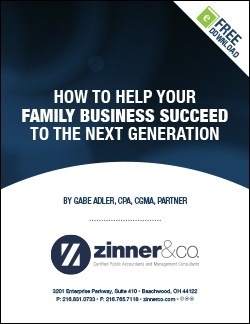Based on presentation by Robin Baum at the 2016 Cleveland Boy Scout Estate Planning Seminar. Article submission to the Ohio Probate Law Journal
Using a Buy-Sell Agreement to Establish Estate Tax Value
DeAnna Alger, CPA business valuation , DeAnna Alger , Estates, Gifts & TrustsMany closely-held business owners devote the majority of their lives to developing a successful business.
Therefore, as part of their estate planning strategy, small business owners want to ensure that the worth of their business is properly valued, especially if the business must be sold in order to pay estate taxes. If drafted properly, a buy-sell agreement is an effective tool that can be used to set the value of a closely-held business interest.
Read more from Deanna Alger, CPA
5 Things You Need to Know About Naming a Beneficiary
Zinner & Co. Tax Department Estates, Gifts & TrustsAs busy professionals, caregivers, and the like, we tend to put off until tomorrow that which isn't deemed critical today. One such item that we cannot afford to delay is the filing of a beneficiary designation form.
Using Your 990 to Tell Your Story
Chris Valponi, CPA non-profits , Estates, Gifts & Trusts , Chris ValponiMore and more third parties are looking at not-for-profit organizations’ IRS Form 990, so don’t just report; learn how you can use your 990 to tell your organization’s story.
Thinking about and actually forming an estate plan is not an easy task. Most people will admit putting off the process because they do not want to think about death. But, if you look at estate planning as an action of love, you may begin to see it from another perspective.
What many do not consider unless they have dealt with it first hand is that being a widow or executor is equally, if not more difficult, to deal with. Not only are they forced to sift through many financial and legal documents, but also grieve while doing so. I was once an executor for a client who passed away with no family members other than a niece that lived several hours away. His financial records were a mess.
As you can imagine, it was quite the process of collecting his records and figuring out who to contact for his life insurance and retirement accounts and identifying all of his assets. As the executor, part of my job was to locate, collect, and distribute his assets to his friends and family members as his Will stated, but how could I be certain all of his assets were actually collected? One Saturday, with his niece, we drove to every bank in the area and asked if he had an account. We found two safety deposit boxes, one checking account, and two CDs we had no idea he had (all at different banks).
A simple document can assist in making the process far easier. I like to refer to it as a love letter, others may call it a letter of instruction. This could be the most appreciated letter you ever write.
Simply, it is a letter to your spouse, executor, and beneficiaries that includes, but is not limited to, a list of your estate planning documents and brief description, list of your assets (including bank accounts, life insurance, retirements accounts, etc), and identify and provide contact information for your advisors (accountant, attorney, investment).
The amount of information you could include in this instructional letter is endless. Consider also your social media and email usernames and passwords. Most companies have very strict policies about who can access an account after death.
Would you want your Facebook or email account closed after you pass? If so, providing your usernames and passwords, with your wishes, ensures all accounts will be closed or updated as you desire. Let’s not forget about your mortgage, credit cards, car loan, student loan, Section 529 plan, and human resource contact information at your employer.
Estate planning can be confusing. We are available to help you plan so your future, and those of your loved ones, is solid and secure. Please feel free to contact us at info@zinnerco.com or 216-831-0733.
Estate planning impacts everyone, regardless of whether or not their estate will be taxable. Therefore, proper care should be taken in the planning process. With the estate lifetime exclusion amount currently set at $5.43 million for 2015, the majority of individuals do not need to worry about filing an estate return, as their estates are not taxable. However, what happens if their spouse’s estate would end up being taxable? One important estate planning tool to consider, in this case, is portability, which is only available when one files a return, even if it would not otherwise be required.
Move South to Retire? Your Old Residence Could Still Tax You!
Zinner & Co. gift tax , Taxes - Planning, Rules and Returns , Business - Management, Issues & Concerns , Estates, Gifts & TrustsBy the Tax Services Department
You’ve finally made the decision to become one of “those people.” You know, the person who, as was drawing closer to retirement (and coincidently, during one of the never-ending sub-zero days of winter), decided that living somewhere south of the Mason-Dixon line just made sense. You meticulously planned to move south to retire. But, before you settle back in the lounge chair twirling the paper umbrella as it shades your Pina Colada, you may want to ensure you have all of your assets in order.
Reducing Gift Tax for Private or Family Owned Businesses
Zinner & Co. gift tax , Taxes - Planning, Rules and Returns , Business - Management, Issues & Concerns , Estates, Gifts & TrustsBy Tax Services Department
I once had a wealthy client who was a private business owner that wanted to gift a vacation home to his children. Based on prior gifting, to transfer the property outright, he would have incurred a 40% gift tax rate on a portion of the value of the home because the fair market value was in excess of their remaining gift tax exemption.
As his advisor, we had discussed his long-term financial goals and created an Ohio limited liability company so the vacation home could be deeded into the LLC. Since the home was now an LLC asset, he had a qualified professional perform a valuation of the LLC.
Assigning several “discounts” for the value of the LLC , when he transferred the LLC ownership to the children, he was able to reduce the fair market value of the vacation home by using a 30% discount per the valuation. This simple planning allowed him to transfer the vacation home to his children without incurring any gift tax.
Needless to say, valuation discounts are a very important and significant component of estate planning. The two main discounts are lack of control and lack of marketability.
Lack of Control
Typically, when ownership of a family business is gifted to family members of a lower generation, the control stays with the older generation by the use of voting and non-voting stock. While the IRS originally maintained that valuation discounts for minority interests (lack of control) were not available, the IRS changed its position in 1993, in Revenue Ruling 93-12.
Lack of Marketability
In addition, a discount for a lack of marketability has been allowed because the Family Limited Partnership (FLP) units are not sold in the stock or other open market and are not easily valued. The lack of marketability discount is available because of the difficulty of selling “hard to value” assets. This opened the door for FLPs and family limited liability companies (FLLCs) to become very useful estate planning tools.
Understanding the Tax Benefits of a Same-sex Marriage
Zinner & Co. DOMA , Taxes - Planning, Rules and Returns , Estates, Gifts & TrustsWith the Supreme Court ruling same-sex marriage is a right for all married same-sex couples should know the tax benefits they will receive beginning this year.
About Us

Since 1938, Zinner has counseled individuals and businesses from start-up to succession. At Zinner, we strive to ensure we understand your business and recognize threats that could impact your financial situation.
Recent Blog Posts
Categories
- 1031 Exchange (2)
- 401k (2)
- 529 plan (4)
- ABLE Act (1)
- account systems (3)
- accounting (8)
- Affordable Care Act (8)
- alimony (2)
- American Rescue Plan Act (1)
- Ask the Expert (5)
- Audit and Assurance Department (14)
- audits (8)
- banks (1)
- Barbara Theofilos (6)
- Bitcoin (1)
- block chain (2)
- Bookkeeping (1)
- Brett W. Neate (28)
- budgets (1)
- Bureau of Worker's Compensation (12)
- Business - Management, Issues & Concerns (46)
- business income deduction (3)
- business succession (7)
- business travel expense (3)
- business valuation (5)
- capital gains (2)
- careers (7)
- cash flow (2)
- Child Tax Credit (2)
- Chris Valponi (8)
- City of Cleveland (1)
- Cleveland COVID-19 Rapid Response Fund (1)
- Cleveland Rape Crisis Center (2)
- college (3)
- Community (24)
- Coronavirus (24)
- COVID-19 (30)
- Credit card fraud (4)
- credit reporting (1)
- cryptocurrency (2)
- cybersecurity (14)
- dead (1)
- DeAnna Alger (6)
- death (2)
- debt (4)
- deductions (14)
- Deferring Tax Payments (4)
- Department of Job and Family Services (2)
- depreciation (1)
- Digital Tax Payment (1)
- divorce (4)
- DOMA (3)
- Economic Impact Payments (2)
- Economic Injury Disaster Loan (4)
- education (8)
- EIDL (1)
- electronic filing (4)
- Electronic Tax Payments (2)
- Emergency Working Capital Program (1)
- employee benefit plan auditor (1)
- Employee Leave (2)
- Employee or Independent Contractor (5)
- Employee Retention Credit (3)
- employment (2)
- ERC (3)
- Eric James (8)
- Estates, Gifts & Trusts (47)
- expenses (5)
- Families First Coronavirus Response Act (2)
- FASB (1)
- FBAR (1)
- FDIC coverage (1)
- Federal Assistance (4)
- filing (3)
- financial planning (8)
- Financial Planning - College (9)
- financing (3)
- Firm news (119)
- first responders (1)
- FMLA (1)
- foreign assets (3)
- fraud (38)
- FSA (1)
- fundraising (9)
- Gabe Adler (1)
- gift tax (5)
- HDHP (2)
- health care (3)
- home (2)
- home office (1)
- Howard Kass (2)
- HRA (1)
- HSA (5)
- identity theft (28)
- income (1)
- income tax (56)
- independent contractor (1)
- Inflation (1)
- Insurance (7)
- internal control (4)
- international (2)
- Intuit (1)
- investments (4)
- IRS (85)
- jobs (5)
- John Husted (1)
- K-1 (1)
- Laura Haines (2)
- Layoff (2)
- Layoffs (1)
- leadership (3)
- lease accounting standards (1)
- life insurance (1)
- LLC (3)
- Loans (2)
- longevity income annuities (1)
- Lorenzo's Dog Training (1)
- Magic of Lights (1)
- management advisory (3)
- manufacturing (2)
- Matt Szydlowski (3)
- medical (7)
- Medicare (2)
- mergers and acquisitions (1)
- Mike DeWine (2)
- Millennial Concepts (2)
- minimum wage (1)
- NAIOP (1)
- non-profit reporting (10)
- non-profits (38)
- not-for-profit (26)
- ODJFS (1)
- office (1)
- ohio (10)
- Ohio business owners (18)
- Ohio Department of Jobs and Family Services (3)
- Ohio Incumbent Workforce Training Voucher Program (1)
- Online Tax Payment (2)
- Operations (2)
- OPERS (1)
- owners of foreign entities (1)
- partnerships (5)
- Paycheck Protection Program (9)
- payroll (8)
- penalties (3)
- pension (2)
- personal finance (2)
- planning (4)
- ppp (7)
- Productivity (5)
- Qualified Business Income (1)
- quickbooks (10)
- real estate (13)
- record retention (2)
- records (2)
- Republican National Convention (1)
- Retirement Planning & IRAs (52)
- Richard Huszai, CPA (5)
- RITA (1)
- Robin Baum (6)
- RRF (1)
- S Corporation (1)
- SALT (8)
- SBA (8)
- scams (9)
- SECURE 2.0 Act (1)
- security (5)
- SharedWorks (1)
- Shutdown (3)
- Silver Linings (9)
- simplified employee pension (1)
- Small Business (5)
- SMB (12)
- Social Media (1)
- social security (4)
- Speaker Series (2)
- spouse (1)
- start ups (8)
- Stay at Home Order (3)
- Steven Mnuchin (1)
- Sue Krantz (6)
- SVOG (1)
- tangible property (1)
- tax (26)
- tax avoidance (11)
- Tax Credit (5)
- Tax Cuts and Jobs Act of 2017 (31)
- Tax Interns (2)
- tax services (28)
- taxes (44)
- Taxes - Corporate & Business (98)
- Taxes - Individual (114)
- Taxes - Planning, Rules and Returns (185)
- technology (6)
- The CARES Act (6)
- The SOURCE (1)
- tiag (3)
- transaction advisory (2)
- Treasury Department (4)
- tuition (3)
- U.S. Department of the Treasury (1)
- U.S. Small Business Administration (6)
- Unemployment Benefits (4)
- withdrawls (2)
- withholding (6)
- Workers Comp Billing Changes (1)
- Zinner & Co. (28)
- Zinner News (27)












